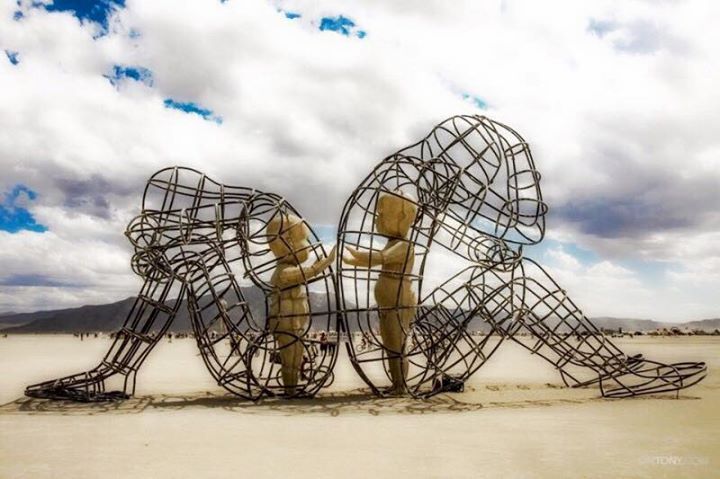A short story, born of a real-life experience backpacking in Wyoming, that puts forward the notion that sometimes we aren’t exactly sure what we want in life, until it falls right into our hands…

by: Betty Joyce Nash
We end our Wind River Range trek in Pinedale, Wyoming, at the SuperValu’s Dumpster. We’d spent a week gasping for breath above the tree line, where fresh air scrubbed pollution from our New York City lungs. I inhaled and exhaled deeply, loving the sound of me vacuuming myself.
One leg out of the rented SUV’s door, Marsha says she’ll grab road food. “You ditch the trash since it was your bright idea to pack out the poop, Sherry.” She hikes across the asphalt to the store — a fake log cabin guarded by a stuffed grizzly.
I hate cutesy retail, especially in strange western towns. I’m the practical member of us — wilderness etiquette forbids burying paper or poop, so I insisted we bag ours. It’s in back now, with empty freeze-dried dinner sacks, Starbucks coffee singles, used Tazo tea bags, and a partial roll of Seventh Generation toilet paper.
Up top, the Dumpster’s overflowing. The wilderness of black plastic jumps. Wildlife possibilities assault my imagination: raccoons, possums, even bears. Before the trip, Marsha and I practiced, in pajamas, surviving a grizzly encounter: We backed away, spoke in low tones, and played dead, watching ourselves in the mirror and hooting with laughter.
I’m staring at a creature now, our only wildlife sighting besides the marmot who stole our lunch carrots on Grizzly Gulch Trail. It’s a shirtless kid, human, with sharp wingbones, who hefts a bottle to the light, uncaps it, grins down at me, and swigs. I pray the liquid’s alcohol. Would that sterilize it?
I fake sleep, so the kid’ll scram and I can unload the garbage. Wouldn’t want a kid pawing through our bag, now starting to reek.
Minutes later, a voice breaks into my doze. “You sleep in your car?”
Wild Thing hangs half in the passenger window, with a crushed but unopened bag of chips and liter of soda. “Want some?”
“No, thanks.”
At the SuperValu, Marsha’s not even inside the barn-like sliding door. She’s chatting up a child waiting to ride the bucking bronc merry-go-round. An early learning educator, she claims the first six months of life matter most. What happened in my first six months that turned me into a bank analyst?
Up close, the kid’s amber skin glows and his eyes look soft, like road tar on a hot day. “Where’s your friend?”
I nod at the store. Wild Thing teeters and flops, belly down, across my thighs. I freeze. The kid settles in the driver’s seat and balances filthy feet on the steering wheel. “OK if I sit here?”
“What’s your name?”
“Dexter.”
He sets his bottle between the seats, kneels, and pretend steers. “Your hair looks like my mom’s.”
And yours, I don’t say, my fingers ratting my own dark, spastic strands. I need to trash the trash and get rid of this kid who’d dropped out of the dumpster and into my lap. Marsha and I had watched adoption videos from foreign countries, a phase of Marsha’s for a year before our application was denied, who knew why?
Dexter cranes his head out the window. His hair, though tangled, shines. He climbs on my lap. He stinks, like I do now — of sweat and work and earth. And garbage. Soon he leans hard against me, his wing jabbing my breastbone. “Pee-ew,” he says. We laugh.
“What’s your mom doing now, Dexter?”
“Working, I said already.” He digs at his eyes and turns toward me, this nearly weightless phantom, with shockingly sweet breath. He lays his head against my chest. I hold my breath. Marsha will return soon, in a hurry to get to the airport.
“What if you had somebody like…me for a mom?” The words slide from my mouth like drool. I swallow hard.
Marsha’s trudging toward the SUV, a bag under each shoulder. I loosely wrap my arms around Dexter’s birdlike ribcage; our hearts race.
He leans out again, kneecaps kneading my thighs. “Silly. I gots a mom.” He corkscrews himself head first out the window.
“Careful!”
But Dexter lands on his hands. His foot soles, black with dirt, briefly pedal air. He backflips, stands, and waves, then vanishes into the scrub bordering the asphalt prairie.
“Who was that?” Marsha pokes her head in the SUV. “Pop the back, will you?”
“Dexter.” I get out and lift the hatchback, hoist our waste, and heave it atop the Dumpster’s pile. Hands on hips, I survey the bushes for signs of Dexter — a foot, a hand. He must be in there somewhere.
Marsha cranks the SUV. We drive away. “How sad, that child. What were you two talking about? I saw him tumble out of the car. You don’t much like kids, you said before.”
My lungs need scrubbing again. My chest clogs. I buzz down the window and gulp air.
“Was he begging? Did you give him money?”
“No. He wasn’t begging.” I breathe. “I was.”
Betty Joyce Nash a journalist and fiction writer from Charlottesville, Va. She has published articles and essays in newspapers, magazines, and short stories in literary journals such as NDQ and North Dakota Quarterly. In 2015, she won the F. Scott Fitzgerald fiction prize. With a colleague, she conceived, edited, and contributed to an anthology of literary fiction in which guns play a compelling role, Lock & Load: Armed Fiction. (University of New Mexico Press, 2017) The anthology features stories by noted writers such as Annie Proulx and John Edgar Wideman as well as new narrative voices.





